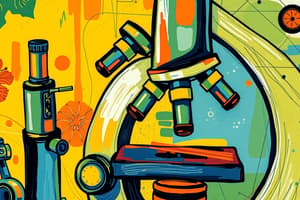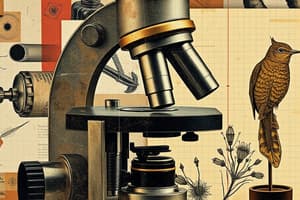Podcast
Questions and Answers
What is the minimum distance at which two points can be distinguished as separate by the human eye?
What is the minimum distance at which two points can be distinguished as separate by the human eye?
- 50 µm
- 500 µm
- 100 µm (correct)
- 10 µm
What is the role of the objective lens in a compound microscope?
What is the role of the objective lens in a compound microscope?
- It projects the final image to the eye.
- It focuses the parallel rays of light.
- It adjusts the focal length.
- It magnifies and projects the image into the body tube. (correct)
Resolution allows the eye to distinguish between two objects. What enhances this ability?
Resolution allows the eye to distinguish between two objects. What enhances this ability?
- Using higher brightness in the light source.
- Increasing magnification. (correct)
- Decreasing the distance between the objects.
- Using a larger lens size.
When a convex lens focuses light rays, what point is formed?
When a convex lens focuses light rays, what point is formed?
What is the total magnification achieved by a microscope?
What is the total magnification achieved by a microscope?
What happens to the resolving ability of the eye when an object is brought closer using a lens?
What happens to the resolving ability of the eye when an object is brought closer using a lens?
Which of the following is a characteristic of a compound microscope?
Which of the following is a characteristic of a compound microscope?
What is focal length in the context of a lens?
What is focal length in the context of a lens?
What is the correct action to take before increasing magnification on a microscope?
What is the correct action to take before increasing magnification on a microscope?
When using a microscope, what should you avoid doing when adjusting focus after moving to medium or high power?
When using a microscope, what should you avoid doing when adjusting focus after moving to medium or high power?
How should light intensity be regulated when using a microscope?
How should light intensity be regulated when using a microscope?
What is the purpose of using a ruler when estimating the size of an object on a microscope?
What is the purpose of using a ruler when estimating the size of an object on a microscope?
Which component of the microscope is used to improve image clarity after focusing?
Which component of the microscope is used to improve image clarity after focusing?
What should be done with the microscope after use?
What should be done with the microscope after use?
What is the first step in estimating the size of an object using a ruler?
What is the first step in estimating the size of an object using a ruler?
What is a consequence of forgetting to return to low power before removing the slide?
What is a consequence of forgetting to return to low power before removing the slide?
What happens to the working distance as magnification increases?
What happens to the working distance as magnification increases?
What should you avoid using for cleaning the microscope lenses?
What should you avoid using for cleaning the microscope lenses?
Which focusing knob should only be used at low power?
Which focusing knob should only be used at low power?
How should microscopes be carried to prevent damage?
How should microscopes be carried to prevent damage?
What is the effect of increasing magnification on the focal plane?
What is the effect of increasing magnification on the focal plane?
What precaution should be taken regarding electric cords around microscopes?
What precaution should be taken regarding electric cords around microscopes?
What should be done before turning on the illuminator on a microscope?
What should be done before turning on the illuminator on a microscope?
What is the recommended action when focusing on a specimen?
What is the recommended action when focusing on a specimen?
Flashcards are hidden until you start studying
Study Notes
Microscopy Review
- Human eye resolution is limited to objects at least 100 µm apart; closer objects appear as a single entity.
- Resolution is the ability to distinguish between two close points; increasing magnification enhances this capability.
- Objects appear larger when viewed through lenses; this improves resolving power by spreading the image over more receptor cells.
- Compound microscopes utilize multiple lenses: the objective lens near the specimen and the ocular lens for viewing, creating a combined magnification effect.
- The focal point is where light rays converge through a convex lens; focal length is the distance from the lens center to the focal point.
- Shorter focal lengths correspond to higher magnification and require closer proximity to the object being viewed.
- Microscopy depth of field decreases with increased magnification; focusing must occur through the object at high magnifications.
Proper Use of the Microscope
- Always carry the microscope upright with both hands to prevent damage.
- Place it carefully on a stable surface, avoiding edges and sliding across tables.
- Electric cords should be positioned to prevent tripping hazards.
- Clean lenses only with lens paper; avoid other materials which can scratch the lenses.
- Begin with the stage lowered and the lowest power objective lens; gradually increase light intensity after turning on the illuminator.
- Coarse focus should only be used on low power; always lower the stage to focus the specimen when viewing through the ocular.
- Fine focus is critical for sharpening the image; ensure low power focus before increasing magnification.
- Prioritize centering the specimen before switching to a higher power objective lens; make sure not to contact the slide during changes.
- Return to low power and move the objective away from the slide before removal.
- After use, clean lenses, coil cords, cover the microscope, and store it properly.
Estimating Object Size
- Use a ruler method for size estimation, best when objects are aligned vertically with the stage.
- Focus on an object and position a ruler against the stage edge at the same eye distance.
- Open the other eye to compare the object with the ruler and measure the object's length in cm or half cm.
- Calculate actual size by dividing the measured length by total magnification (Actual Length = Measured Length / Total Magnification).
Microscope Practice
- Estimate the length of one square of graph paper using the above method.
- Practice focusing on an amoeba at various power levels (low, medium, high).
Studying That Suits You
Use AI to generate personalized quizzes and flashcards to suit your learning preferences.




